Screen Industries Strand
The Artist's Journey – Indy Hunjan, Suprasanna Dindigal and Supriti Malhotra
A podcast series by Indy Hunjan, Suprasanna Dindigal, Supriti Malhotra, and Swadhin Padhy for the India-UK Creative Industries at 75: Opportunities and Challenges project
IUKCI@75 is an online AHRC and Innovate UK funded project that brings together artists and creative professionals in India and the UK creative industries, particularly across three strands: Screen Industries, Live Performance, and Fashion.
Together, the artists will share examples from their crafts and engage in dialogue regarding the possibilities, challenges and resources that have affected their respective industries past, present and future, but with a particular focus on working through the COVID pandemic. The IUKCI@75 project provides a space for online networking and the creation of new collaborative short artistic outputs, particularly as India marks 75 years of independence in 2022.
The IUKCI@75 project has connected Indian and UK artists through an online network, with the aim of nurturing cross-cultural dialogue, and enabling participating artists/creative professionals to gain a deeper understanding of the challenges, opportunities and potential resources available to each other and to create new artistic outputs.
The Artist’s Journey podcast series has been created by Group 1 of the Screen Industries strand, for sharing the lived experiences of participating artists/creative professionals through a relaxed conversation about their creative journey, ambitions and important markers that have had the most influence on them.
Through the series, we delve deeper into the transformative influence of participating creative professionals’ pursuit of artistic endeavours, to understand their work in greater detail, including the cultural nuances that drive them, whilst gaining a better perspective on their craft.
For The Artist’s Journey podcast series, we are delighted to have had the opportunity to talk with:
- PROFESSOR RAJINDER DUDRAH, Principal Investigator, IUKCI@75 project
- MR. ANAND CHHABRA Founder, Director and Chair at Black Country Visual Arts
- MR. AMAR KATE, Creative Producer, Director, Editor & Marketing Strategist
- MS. GARGI KUCHERIA, Founder, Kilometre India
- MR. SAURAV SHARMA, singer, songwriter, multi-instrumentalist, composer, and member of electronic band, Sound Valley Projekt
- MS. VAISHALI VERMA, student at Birmingham City University pursuing Master's in Textile & Surface Design
While we loved the opportunity to interact with these six creative professionals, technical issues have caused only 4 interviews to be a part of the final creative output for the IUKCI@75 project.
You can access all the podcasts via:
SOUNDCLOUD: on.soundcloud.com/JT3Q
YouTube: The Artist’s Journey
Voices at 75: Nakul Sawhney, Neeraj Churi and Raveeta Banger
An anthology of short documentary films Voices at 75 is an anthology of three short documentary films at ten minutes each. This anthology explores identity in close relation to freedom. The conversation begins with The Journeys of 377, progresses onto Manifestations of Caste and concludes with discussions about The Girl Child.
The Journeys of 377
In this documentary we look at the targeted violence and subsequent hate crimes that the LGBTQ+ community, in particular our Indian trans community, still face in India as a direct result of the 158-year-old colonial era law under Section 377 of the Indian Penal Code. Section 377 was used by the British Empire to intentionally criminalise LGBTQ+ relationships under the British Raj. Filmed on zoom and a smart phone, we hear through the voices of Indian transgender activist and artist Abhina Aher and British Indian artist and creative director Ash Mukherjee. The Journeys of 377 dissect transphobia and homophobia through the lens of colonisation. From pre-colonial India to present day India, the voices in this film explore what freedom and Independence in the true sense of the meaning for LGBTQ+ people in India and the diaspora can and should look like.
Manifestations of Caste
Through uncomfortable discussions about the existing prejudicial and discriminatory attitudes towards marginal castes or dalit communities, Manifestations of Caste looks at the way Indian society holds onto this ancient and archaic practice that only further divides us. During the colonial era of the British Empire the caste system was further implemented and used to exacerbate communal tensions to create ongoing divisions. Whilst caste discrimination has existed In India as a significant and violent problem before the British Empire, it was intentionally emboldened and exploited during the British Raj. A social ill of untouchability that is still practised and continues to permeate Indian society. Through the voices of an Indian couple choosing to remain anonymous and a newly married British Indian woman Neelam Heera-Shergill we hear of their lived experiences and obstacles faced as Indians in inter-caste marriages.
The Girl Child
Patriarchal attitudes and gender inequality is an ongoing battle for the girl child, women, and communities significantly impacted by archaic means of thinking and being. In The Girl Child we speak to three generations of women from a working class family in India to a young British Indian family with a two-year-old daughter being raised in the UK. Through conversations across borders, this film explores in depth what it means to be the girl child in a world that still has its roots in the firm grips of patriarchy.
Meet the team:
Nakul Singh Sawhney
Nakul is an independent documentary filmmaker based in India. His films focus on religious sectarianism, human rights, and social justice in South Asia. He won the Indian Documentary Producers' Association (IDPA) Silver Award as Best Director for his feature-length film 'Muzaffarnagar Baaqi Hai/Muzaffarnagar Eventually'. The film explored the impact of religious sectarian violence on the Indian General Elections in 2014. As a result, Nakul faced physical attacks and several threats to his work. His other films, including 'Immoral Daughters in the Land of Honour' and 'Savitri's Sisters' have been screened globally. Nakul is also a founder of an award-winning film and media collective in rural North India called ChalChitra Abhiyaan / Moving Images Campaign. It takes international cinema to the hinterlands and trains the marginalised communities to make their own films. He also teaches filmmaking and film appreciation. Currently, Nakul is making a film on the recently concluded farmers' movement in India.
Raveeta Banger
Raveeta Banger is a writer, documentary filmmaker, creative arts researcher and playwright working freelance in the creative industries. Through the creative work undertaken, topics addressing the arts and culture, screen studies, race, caste, identity, mental health and feminist issues specific to Black and Asian women are explored throughout her work. She completed a BA (Hons) in Film and Media at De Montfort University, Leicester, and a MA in Film and Television: Research and Production at the University of Birmingham. You can follow Raveeta’s work at @raveetawrites on Twitter.
Neeraj Churi
Neeraj started his film production journey for the sole purpose of producing and promoting South Asian LGBTQ+ films worldwide, realizing the limited opportunities available to the community to bring their stories to the screen. Through his org, Lotus Visual Productions, he sponsors the QDrishti film grant to help aspiring filmmakers bring their LGBTQ+ scripts to screen. He has produced fiction and documentary films in India and the UK. He helps promote South Asian queer cinema by organizing theatrical screenings in the UK and curating film festivals and corporate screenings. He is an alumnus of the New York film academy.
A pot of home – Amar Kate, Harkat Studios, Pritt Kalsi
This documentary series is an exploration of migration, nostalgia, and identity with an explicit focus on food. Cooking for someone is a form of love; an act of love. The way food is passed down from generations upon generations, they know their home through the food they eat. This is the same kind of food their parents, their grandparents and people before them ate, and even though they might not be in the same geographical location, this particular plate of food is one tangent to what connects them to their homeland.
The two episodes explore journeys of two women - Aqui and Gurmail Kaur. They share their experiences of moving to different cities and places, the food that grounds them to their home and their identity in a new space.
Episode 1 - Aqui
Episode 2 - Gurmail Kaur
Live Performance Strand
Beyond Jogi – Jogan: Rupinder Kaur, Jag Kumar and Manzil Mystics
Beyond Jogi-Jogan is a musical poetic story about the Sufi within. It encourages us to explore our individual identity as we embark upon a journey inspired by many revered Sufi poets, Bulleh Shah being a prominent and respected artist as one. Our project looks at the essence of what it could mean to be a Jogi, Jogan or both. Jogi, Jogan loosely translates to Male and Female Hermit while some also use the words Yogi and Yogini. Interwoven into the music is dance, spoken word poetry and performance to help navigate these stories. The poetry questions one's quest concluding with analysing identity beyond these words. In essence, Beyond Jogi-Jogan is about the freedom that comes to us once we learn to embrace and to let go.
Kandey Utthey – Zubaan-e-Sohni Sohni-Mahiwal: Hardeep Sahota, Saurav Sharma, Sarthak Pawar
Kandey Utthey – Zubaan-e-Sohni Sohni-Mahiwal is an eternal love-story of two lovers and their tribulations to be together; unfortunately, fate had its own plan. The song, ‘Kandey Utthey’ is a beautiful narration of their love-tale and in particular, the conversation between Sohni and her clay waterpot. She would use this upturned vessel to aid her across the river, as she could not swim. This adaptation of the famous Sohni Mahiwal love-tragedy has been portrayed here for the first time from the perspective of Mahiwal, and his anguish in waiting on the other side of the shore of the Chenab River and the ensuing cyclone. Using elements of Panjabi folk music and Djent, our new genre of ‘Panjabi-prog-rock’ is the driving force behind the dance of Mahiwal.
Through new choreography, his anxiety, pain and suffering are depicted here through Panjabi folk dance with a contemporary twist. Presenting the dance of Mahiwal from this beautiful tale: ‘Kandey Utthey Zabaan-e-Sohni’
- Creative Concept: Saurav Sharma, Sarthak Pawar and Hardeep Singh Sahota.
- Mahiwal – Hardeep Singh
- Sahota Sohni – Jasbir Kaur
- Sahota Singer – Saurav Sharma
- Composition - Saurav Sharma and Sarthak Pawar
- Guitars- Sarthak Pawar
- Bass - Sarthak Pawar
- Drums - Aakash Jain
- Music Production – Saurav Sharma and Sarthak Pawar (Sound Valley Projekt)
- Recording, mixing and mastering - Sarthak Pawar INDILAB STUDIOS
- Filming and Editing – John Slemensek
- Green Screen Studios – Kirklees TV
This project is funded by: India-UK Creative Industries at 75: Opportunities and Challenges. An AHRC and Innovate UK funded project that brings together artists and related user-communities in India and the UK across three strands from the creative industries: screen industries, live performance, and fashion.
Migration: A Photographic Journey through Dance – Anand Chhabra, Gawah Theatre Group and Sangini Kumar
This short film was created through collaborative practice by artists from India and the UK. The project was commissioned and co-ordinated by the India-UK Creative Industries at 75 by Birmingham City University c/o Professor Rajinder Dudrah and is commissioned by the AHRC and UKRI. The film has been produced with artists Sangini Kumar and Anand Chhabra with help from editors Ankit Maurya, Jyoti Singh and Akash Tirkey working under the banner of Team Gawah Theatre c/o Anirudh Sudhanshu.
Special thanks to ARC Music Productions International Ltd for courtesy of the background music during the dance performed by Sangini Kumar 'Raag: Bilas - Khani Todi Vilambit Gat in Teental 4.4' Performed by Baluji Shrivastav.
The film attempts to depict the lived experiences of the women who joined their husbands from India to settle in the UK. These women experienced much excitement and fear and in the formative years, Punjabi women spoke of their dreams ‘Supnaa’ or nightmares in some cases about indifference they experienced from newfound landscape around them. This translated into race, learning a new language and the challenges of assimilation."
Fashion strand
Flower Power: An Ecological Re-imagining of 1960’s Psychedelia
This project was a collaboration with Caroline Raybould, designer and lecturer at BCU, and Vaishali Verma, textile designer and BCU Alumni. They discovered their shared love of 1960’s textiles, and brought together Vaishali’s print knowledge and Caroline’s natural dye research, to create a range of prints utilizing low impact dyes and sustainable materials.
Group 1 – Jasbir Kaur, Priyanshi Singhal and Sweta Kumari
Jasbir Kaur who is working on Indian fashion diaspora in the West, Sweta Kumari a sustainable designer working with artisans of India and Priyanshi Singhal who is passionate about textile and digital embroidery together wanted to create a platform where they can connect artisans with the world so that their work can be recognized globally. The idea was to make them self-sustainable financially and at the same time fulfil the needs of creative professional who continuously need their expertise and have no clue how to reach them. This platform sure will act as a bridge between artisans and creative world globally.
Trajva Tattoos – Anisha Parmar, Bharti Parmar and Gargi Kucheria
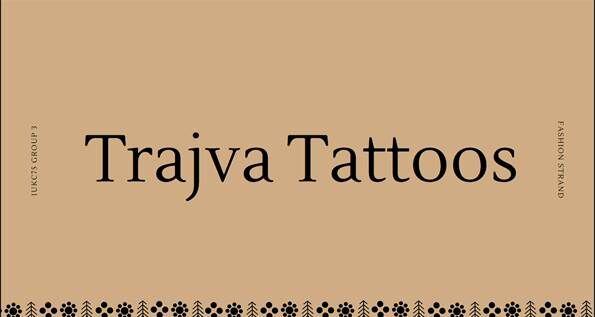
Trajva Tattoos is a short research project about Indian tribal tattoos with:
- Dr Bharti Parmar, artist (UK)
- Anisha Parmar, jeweller (UK)
- Gargi Kucheria, ethical fashion entrepreneur (India)
Our main objective is to conceptualise and promote the cultural practice of traditional tribal tattoos in rural India. As creative practitioners across continents, signs, signifiers and bodily adornment is an interest we have in common.
Trajva Tattoos will:
- Develop research on how and why this form of bodily marking is used in India
- Reflect on how they have been kept alive in the Diaspora
- Foreground indigenous craft practice through contemporary artistic interpretation
The local manifesto – Caroline Raybould, Mala Sinha, Vaishali Verma
This digital booklet aims to relate local stories and promote localism in fashion, textiles and craft as India marks 75 years of independence. Three creative practitioners based in India and the UK, worked together online through the summer of 2022 and explored common threads in their work. Discussions revealed that Covid-19 and its lockdowns had affected their practice, forcing them to draw on local resources and networks. This booklet tells their stories, and explores theories around localism, why it is important, concluding with a joint map of what local means to the practitioners as the project is concluded.
IUK Local Manifesto ShowcaseArtists' Creative Outputs
A.R. Rahman Mayya Mayya Dance Cover by Vishal for the India – UK Creative Industries at 75 project
First of all, I would like to thank Birmingham City University for inspiring and enlightening people about India-UK art and culture through their India-UK Creative Industries at 75 project. It is through the opportunities of this project that as artists we are able to gain people's attention and let them know that art has no gender, no colour, no shape, no limit, no boundaries; it should not lead to discrimination, and everyone has the right to show their talent as it is.
With respect to the art of dancing, I have found in my experience, that over the years Indian males being interested in dance has become more common. I remember when young men like myself first became interested in the art of dance, those who were not part of the dance community did not quite understand it and some quickly labelled male dancers as “feminine”. As our generation grows and develops, my wish is for us to be more accepting and open towards gender equality in art forms such as dancing. We should not be gender biased, we should be respectful of someone's profession and talents too.
This dance piece that I have devised encapsulates a vision for equality where we could make each other happy through our art forms. In doing so, the world could be a much better place, where everybody is allowed to show who they really are and express their talent and art the way they want it to be.
Last but not the least, I really appreciate the effort made by Professor Rajinder Dudrah and colleagues. Thank you, Rajinder, for providing me with such a great opportunity to present myself, my art, and to learn from other India-UK creatives and to offer this dance piece as part of your project’s creative ensemble.
Vishal, New Delhi, India.
Student Md. Samir Ansari from Dhanbad in Jharkand, India has sketched 3 images inspired by the project
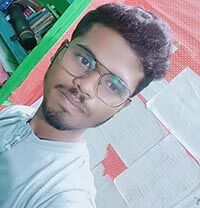 As a student and eager creative, to be part of the ‘India-UK Creative Industries at 75’ project has been special for me. It has given me an opportunity to find out about the work of other artists across India and the UK and in seeing and hearing some of their presentations this has inspired my own budding work. In my artwork, the culture of ancient and modern India is represented through my personal take on it. In the collection I have drawn a series of images that show a mix of cultures.
As a student and eager creative, to be part of the ‘India-UK Creative Industries at 75’ project has been special for me. It has given me an opportunity to find out about the work of other artists across India and the UK and in seeing and hearing some of their presentations this has inspired my own budding work. In my artwork, the culture of ancient and modern India is represented through my personal take on it. In the collection I have drawn a series of images that show a mix of cultures.
These include:
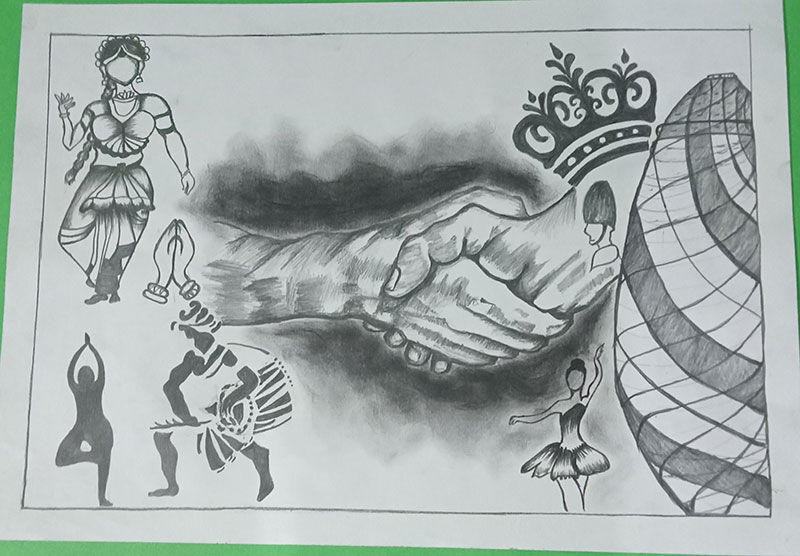
The culture of Rajasthan is depicted through the traditional dance of Ghoomar. I was excited by the work of artists in the Live Performance strand.
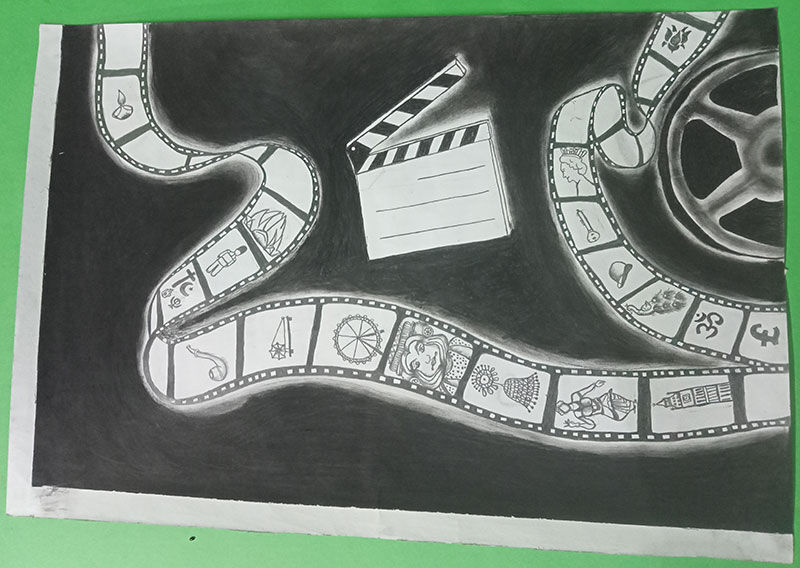
The artwork also depicts Chhath Puja, which is a cultural festival celebrated by the people of Bihar and Jharkhand. It has been celebrated since ancient times where people worship the rising and setting sun.
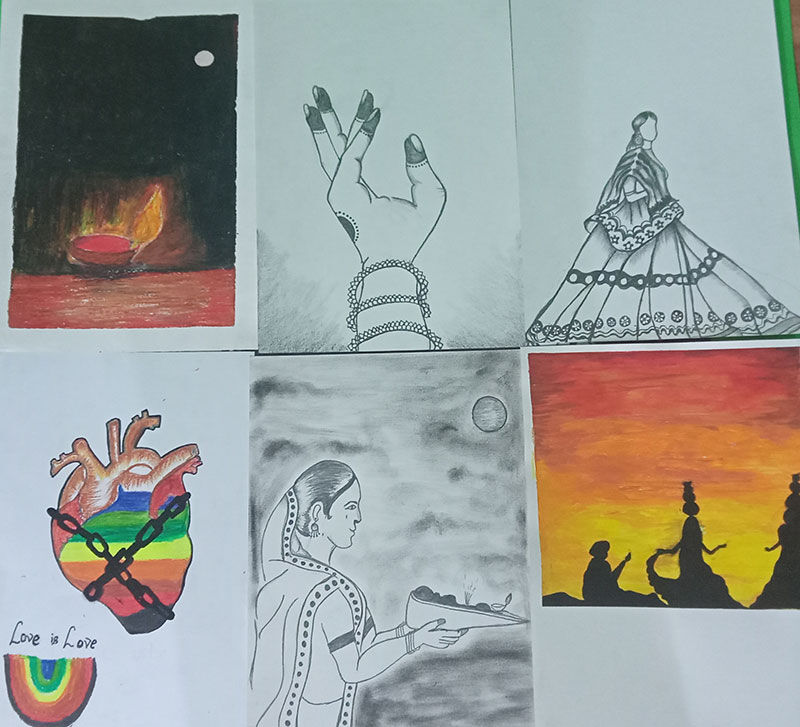
To date, LGBTQ people do not have full rights and freedom in modern India. This painting has been inspired by their heart and courage to be advocates for social change.
Samir can be contacted via Instagram.
Rootha Yaar Manawangi – Sangini Kumar, Saurav Sharma, and Anand Chhabra
This work has been co-created and co-produced with artists Sangini Kumar, Saurav Sharma, and Anand Chhabra with help from guest videographer and editor Raghu Raman.
The project was commissioned and co-ordinated by the India-UK Creative Industries at 75 by Birmingham City University c/o Professor Rajinder Dudrah and is commissioned by the AHRC and UKRI.
- Sufi Poetry of Baba Bulleh Shah, "Rootha Yaar Manawangi" informed by Saurav Sharma
- Song "Rootha Yaar Manawangi Remix Version" composed, arranged and music produced by Saurav Sharma (co founder of Sound Valley Projekt)
- Dance choreographed and performed by Sangini Kumar
- Intro and other photographic imagery by Anand Chhabra
- Guest cinematography and editing by Raghu Raman
Special Thanks to Archaeological Survey of India (ASI).
Rootha Yaar is a poem written in the 17th century by a Sufi Mystic Baba Bulleh Shah which highlights the pain and longing of a ‘Murid’ (Disciple) separated from his ‘Murshid’ (Guru). It was written at a time when Bulleh Shah was learning a form of dance from the 'Kanjar Tribes' with the sole motive to make his 'Murshid' happy so that he would embrace his beloved Bullah. The poetry in itself has a deeper meaning of love, a Sufi love.
Somveer Kamalnath from Saharanpur, Uttar Pradesh, India has sketched 4 images inspired by the project
 I am Somveer Kamalnath from Saharanpur, Uttar Pradesh, India. I got inspired by the artists of the India-UK @75 project and decided to participate. These artists are changing the world through their art. Similarly, I tried to represent the cultural connections between India and the UK through paintings. My first sketch of blossoming flowers shows the friendship between the two countries. The second portrays folk art and dance of the UK and India; the third commemorates the resilience and support of the doctors and teachers during the pandemic. The last painting highlights the importance of the environment and cleanliness for safeguarding humanity from future pandemics and diseases.
I am Somveer Kamalnath from Saharanpur, Uttar Pradesh, India. I got inspired by the artists of the India-UK @75 project and decided to participate. These artists are changing the world through their art. Similarly, I tried to represent the cultural connections between India and the UK through paintings. My first sketch of blossoming flowers shows the friendship between the two countries. The second portrays folk art and dance of the UK and India; the third commemorates the resilience and support of the doctors and teachers during the pandemic. The last painting highlights the importance of the environment and cleanliness for safeguarding humanity from future pandemics and diseases.
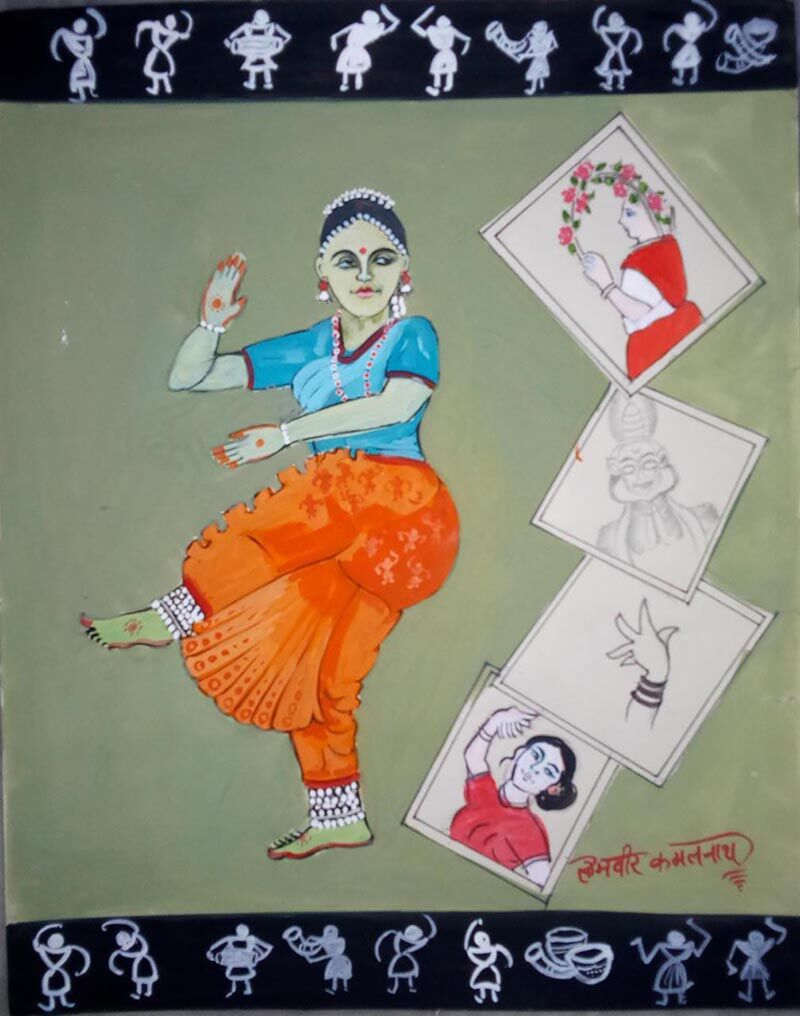
Folk art and dance are popular both in the UK and India. Different states in India have their folk traditions and dances, such as Bharatnatyam, Kathak, Nautanki, Kajri, and Rassleela, to name a few. I have painted the Worli folk dance from Maharashtra, a western state in India, along with other Indian folk dances. Folk artists keep traditions alive and connect them with the present generation.
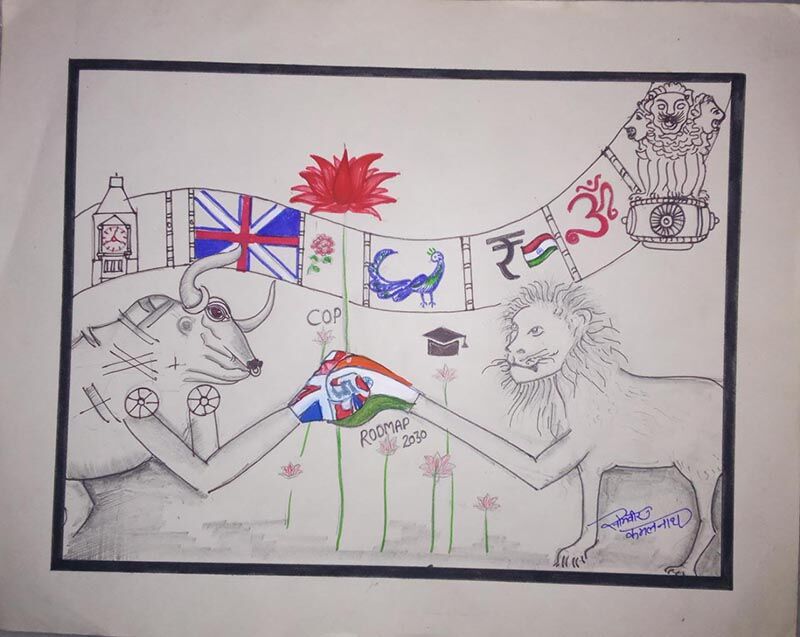
The India-UK@75 project inspires me, and this painting celebrates the bilateral ties between the two countries. The lion with a tricolour, the Birmingham bull with the UK flag shaking hands, and a blossoming flower represent friendship and future collaborations in various fields, including education as per the UK-India Roadmap for 2030.
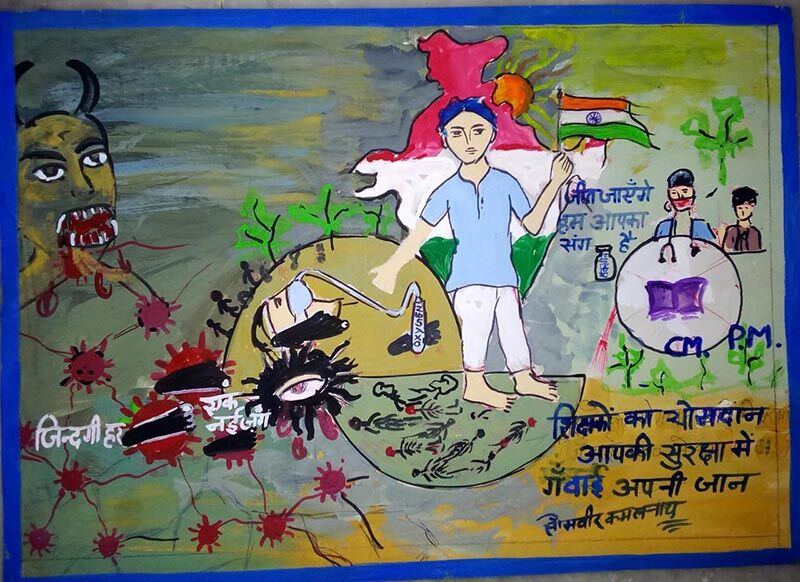
This painting is a tribute to the Corona Warriors like the doctors, sanitisation workers, police, teachers and other service sectors who stood tall in the pandemic for humanity. Hopefully, the pandemic is almost over, and we survived because of the sacrifices of the corona warriors.
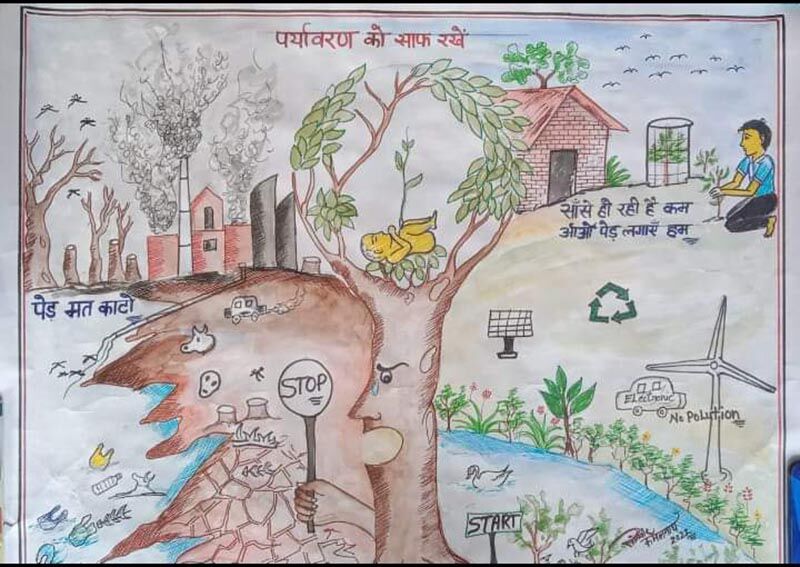
The late Lata Mangeshkar ji’s famous song ‘jindagi her kadam ek nayi jung hai / life is a new battle at every step’ sounds so real during the pandemic years 2019-21. Hence it is essential to care more about the environment and our planet. Trees and water bodies are important for our survival; we need to strengthen our ecosystem through reducing pollution. This painting highlights the importance of a clean and green environment.
Somveer can be contacted via Instagram.
India-UK Creative Industries at 75 food-themed stories – Pritt Kalsi and Amar Kate
Here is the 3rd Episode from our India-UK Creative Industries at 75 food stories. In partnership with BCU (Birmingham City University) the team of Pritt Kalsi (UK) & Amar Kate (India) once again continue their food-themed stories.
This episode features Kulwant Kaur, who inspired by her parents' kindness to others embarked on a journey to address the growing issues of homelessness in Southall, west London. Through donations, her mother would cook and distribute food to those in need. Her mother who was a practising Sikh who believed in the idea of Seva (Selfless service to others).
Kulwant further looked at the issues and challenges faced by the homeless where a lot of the time English is not their first language, and where they had have very little awareness of places and services that can help them. Not alone, Kulwant is supported by many members of the Southall community who want to help. This film looks at Kulwant’s story to further raise awareness of her work and cause.
When we originally started the project our main theme was identity and how food is a constant reminder of who we are and where we came from. In this film, you will see how the community prepares and distributes food, in many cases as a reminder of home and some of the flavours that for even a small moment comforts them.
We would like to pass on our regards to the Matharu family and pay respects to Mrs Surjit Kaur who sadly passed on while making this film.
Hardeep Sahota, Saurav Sharma and Sarthak Pawar - Sohni-Mahiwal, A Tale of Two Worlds
This podcast draws inspiration from the story of ‘Sohni-Mahiwal’, a popular tragic folktale from Panjab. It centres around a collaborative project carried out during the ‘India-UK Creative Industries at 75’ research initiative which brought together artists Hardeep Sahota (academic and dancer), Saurav Sharma (singer and multi-dimensional musician) and Sarthak Pawar (audio engineer, music producer). We hear about their explorations and how they expanded their creativity and pushed the boundaries of their practice, as well as the development of their ideas for future collaborations.
Tattoo.Inventory by Gargi Kucheria, Anisha Parmar and Bharti Parmar

Tattoo.Inventory is a new Instagram page following on from the India-UK Creative Industries at 75 project. It is conceived by three creative individuals of Indian heritage living across India and the UK comprising @gargikucheria entrepreneur India, @anishaparmarlondon jeweller UK, and @bharti.parmar.studio artist UK who have a unique story to tell.
Tattoo.Inventory is a collaborative research project about TATTOOS and its aims are three-fold:
- to educate about traditional tribal tattoos of rural India
- to reflect on how they have been kept alive in the diaspora
- to promote symbolism of these tattoos through contemporary artistic interpretation
Each author is represented by a symbol.
- Gargi Kucheria four grains
- Anisha Parmar ladoo (sweetmeat)
- Bharti Parmar datepalm